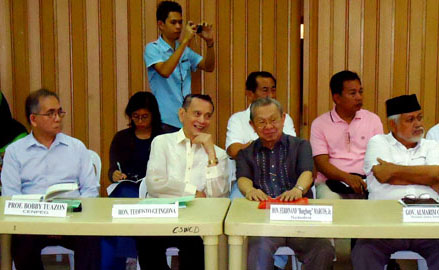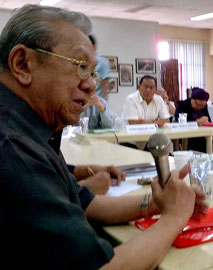The Sabah Standoff: Peace or War?
Skirmishes between Malaysian police and Muslim Filipinos threaten Mindanao peace talks
CenPEG.org
March 19, 2013
The Center for People Empowerment in Governance (CenPEG) said on March 18, 2013 that the Sabah standoff pitting the forces of Sulu Royal Army (SRA) and Malaysian authorities may either lead to a full-blown armed conflict or to peaceful settlement of the century-old territorial dispute.
Bobby M. Tuazon, CenPEG director for policy studies, made the prognosis in a synthesis that concluded the “Inter-Agency Consultation on Sabah Issues” held at Bulwagang Tandang Sora, CSWCD building, UP Diliman.
The four-hour roundtable discussion was organized by the UP Institute of Islamic Studies (IIS) in cooperation with the university president, the House committee on Muslim affairs, and CenPEG.
The consultation was also held as the country commemorated the 45th year of the “Jabidah Massacre” of 68 Muslim recruits, mostly young Tausugs, in a secret training camp on Corregidor Island. The training in 1968 was said to be part of a plot called “Oplan Merdeka” (freedom in Bahasa Melayu) hatched by then President Ferdinand E. Marcos to take over Sabah (formerly North Borneo) – a subject of claim by the Philippine government and Sulu sultanate.
Tuazon said the fighting in Sabah where some 62 SRA members have died, according to Malaysian police, warrants an immediate and decisive response by the Aquino II administration clarifying its position on the territorial claim. Expressing the sense of some discussants, he said that President Benigno S. Aquino II faces the dilemma of either pushing forward the government’s peace process with the Moro Islamic Liberation Front (MILF) facilitated by Kuala Lumpur or heeding the demand of the Sulu sultanate to recover Sabah from Malaysia.
Majority of the discussants, who included Muslim opinion makers, former legislators, and representatives of Muslim NGOs, agreed that the Sabah claim should be pursued peacefully. They said however that Aquino II was sending a wrong signal by telling the SRA members they faced arrest and prosecution for resorting to armed engagements in staking their claim on Sabah.
Some raised the issue whether Malaysia still has the moral ground to facilitate the peace process between the Philippine government and MILF.
UN Secretary General Ban Ki-moon has asked for a ceasefire while Malaysian authorities demanded the extradition of Sultan Jamalul Kiram III, leader of the SRA, to face prosecution in Kuala Lumpur.
Former Vice President Teofisto T. Guingona, Jr. decried the human rights violations being committed against Filipinos in Sabah, calling it “reckless and inhuman” and a dishonor to the Philippines. “Sabah is ours,” he said, and must therefore be pursued peacefully or “fight if we must.”
Hundreds of Filipinos have fled Sabah by boat for fear of war escalation and further displacements as Malaysian police hunted down remnants of the SRA believed to be still holed up in Lahad Datu and neighboring towns in Sabah. Figures of casualties are conflicting. SRA fighters who have returned to Mindanao say about 60 Malaysian forces have been slain.
Merlin Magallona, former Dean of the UP college of law and adviser to Guingona when the latter in a concurrent capacity served as foreign secretary in 2001, said that government should pick up the intervention case filed that year with the International Court of Justice (ICJ) in a parallel territorial dispute between Indonesia and Malaysia.
Leonard de Vera, lawyer of Sultan Jamalul Kiram III, said the government will lose nothing by pursuing the Sabah claim citing the Manila Accord of 1963 which took cognition of the Philippine claim despite the formation of the Federation of Malaysia that incorporated Sabah.
Abraham J. Idjirani, secretary general and spokesperson of the Sultanate of Sulu, said the SRA members went to Sabah to demonstrate the claim on Sabah “after exhausting all peaceful efforts.” He said that the “special power of attorney” given by the Sultanate to the Philippine government had been revoked way back in 1989 or during the Corazon C. Aquino presidency.
Rep. Tupay Loong, chair of the House committee on Muslim Affairs, warned that the Sabah standoff threatened the Philippines’ diplomatic and trade relations with Malaysia. While he agreed that the country should take a common stand for the peaceful resolution of Sabah he urged the active intervention of the UN, the Organization of Islamic Conference, as well as ASEAN.
In his welcome remarks read by the VP for public affairs, UP President Alfredo E. Pascual offered the facilities and expertise of the university in revisiting Sabah and in defining a clear, comprehensive, and coherent policy on the issue.
Lying northwest of Borneo, Sabah is about 29,388 square miles and includes the islands of Banggi and Balembangan. Sabah was ceded to the Sultan of Sulu in 1704 by the Sultan of Brunei. In 1878 Baron von Overbeck, Austrian consul general in Hong Kong, negotiated with the Sultan of Sulu on behalf of English merchant Alfred Dent for the lease of Sabah.
The core issue is whether Sabah was the subject of lease as claimed by the Sulu sultanate or cession as claimed by Malaysia. The Sulu sultanate turned over his claim to the Philippine government in 1962 which, in turn, brought the issue to the ICJ for legal resolution. Diplomatic ties were broken and both countries almost went to war.
Subsequent administrations after Marcos never pursued the claim actively with some attempts during the Ramos administration to scuttle it altogether through a Senate bill.
About 800,000 Filipinos are working and living in Sabah. Five years ago, the Malaysian government threatened to deport the Filipinos.
The Framework Agreement between the Philippine government and MILF, signed in October 2012 in Kuala Lumpur, defines the proposed Bangsamoro sub-state without Sabah. The enactment of a law on Bangsamoro, ratification, elections, and setting up the new autonomous ministerial government are to be achieved by 2016.
Also joining the March 18 inter-agency consultation were, among others, Undersecretary Yasmin Busran Lao, who is also a panel member of the GPH-MILF peace talks; Dr. Bienvenido Lumbera, national artist and CenPEG Board chair; Dante La. Jimenez, president of the Volunteers Against Crime and Corruption; former Sen. Santanina Rasul; Mehol Sadain of the National Commission for Muslim Filipinos; representatives of Sulu People’s Congress; Aileen Baviera, former Dean of UP Asian Center; and Prof. Carmen A. Abubakar.
IIS Dean Julkipli Wadi, who is also a Fellow of CenPEG, acted as facilitator. CenPEG.org\

(L-R) Dean Julkipli Wadi, UP Vice President Prospero de Vera, Rep. Tupay Loong, Undersecretary Yasmin Busran Lao, Abraham Idjirani, Mehol Sadain of National Commission on Muslim Filipinos; extreme right, Dante L. Jimenez, VACC. (CenPEG photo)

(L-R) Bobby Tuazon of CenPEG, former Vice President Teofisto Guingona, Jr., Dean Merlin Magallona, and Gov. Almarim Centi Tillah. (CenPEG photo)

Professor Magallona (left) talks of a Philippine case before the ICJ in 2001. (CenPEG photo)
- Probing presidential platforms
- Conference calls for people-centered policy actions for Asian development and peace
- WWII 'comfort women' urge visiting Japanese emperor: OFFICIAL GOV’T APOLOGY, UPHOLD TRUTH, and JUST COMPENSATION
- FEARLESS FORECAST (EPISODE II): Comelec will not comply with e-Commerce Law in 2016 elections
- Fearless forecast: Comelec’s non-compliance with the AES law in 2016 (last of 2 parts)
- Fearless forecast: Comelec will not comply with the AES law in 2016
- CenPEG releases travelogue
- Experts: Nuisance bets reflect disillusionment, uneven playing field
- Partylist solon presses for tax cuts
- The True Cost of a Political Campaign
- Management decisions: Based on RA 9369 or purely Comelec’s?
- CenPEG holds 1st roundtable with media on presidential poll results
- Filipino IT can do it!
- FIT4E: The only transparent solution
- Realpolitik in the maritime tiff
- China’s challenge to PH sovereignty
- Choosing the next president
- Fixing the presidency, reforming the state
- New Comelec chair says he’s open to other election technologies
- SC ruling on AES Watch Pabillo and IBP vs Comelec, Smartmatic-TIM
- Comelec must explain P3.2B unliquidated cash advances
- CONGRESS ASKED TO HOLD DEMO ON PCOS HACKING
- 25 Bishops ask poll body to stop midnight deal with Smartmatic
- Pope Francis: reform and conversion
- 2 poll watch coalitions stage rally vs Comelec-Smartmatic midnight deal
- AES Watch questions Comelec-Smartmatic midnight deal
- ASEAN-India: Building Youth Partnerships through Culture and Entrepreneurship
- CenPEG forges research exchange and partnership with Jinan University
- FOI: Bearing fruit or foiled again?
- Remittance with Representation: The right to vote of overseas Filipinos
Center for People Empowewrment in Governance (CenPEG), Philippines. All rights reserved


